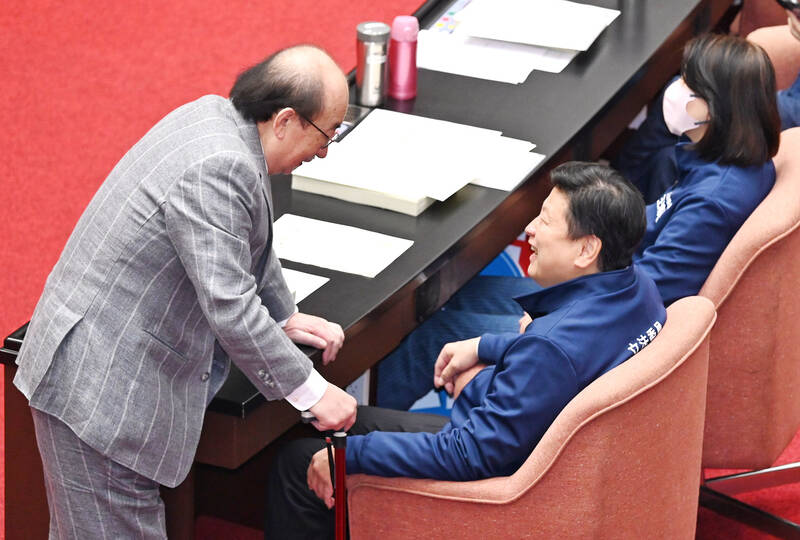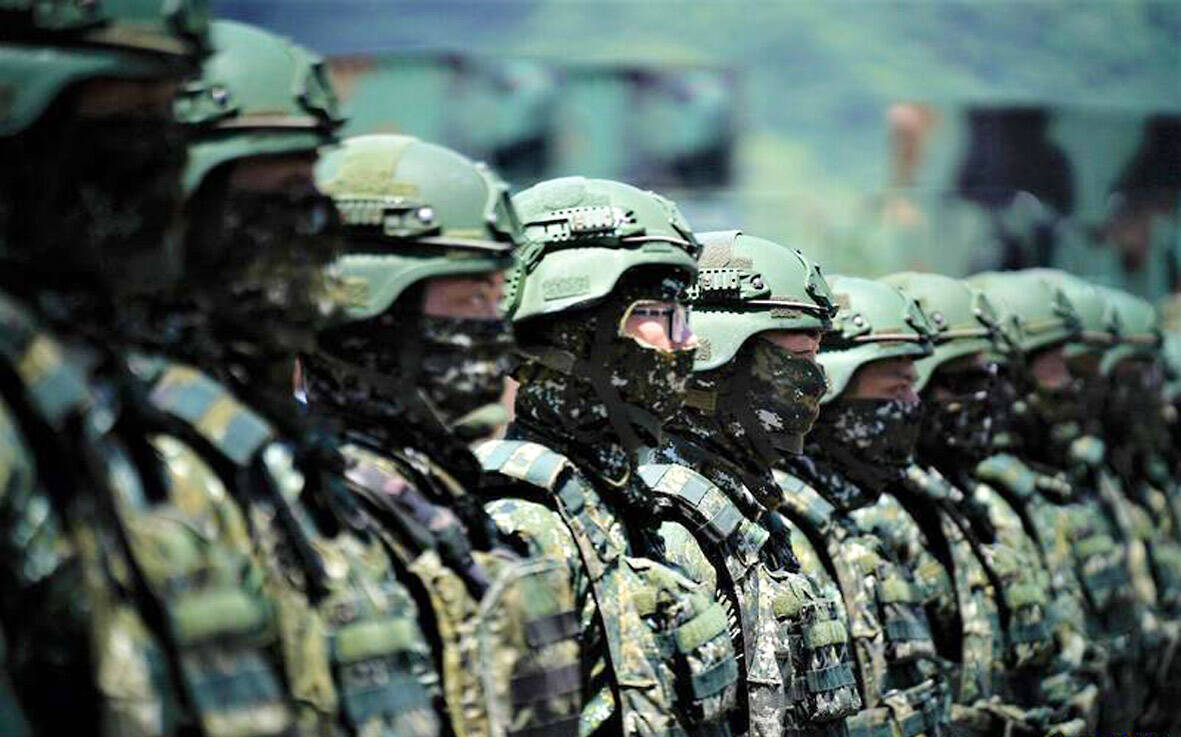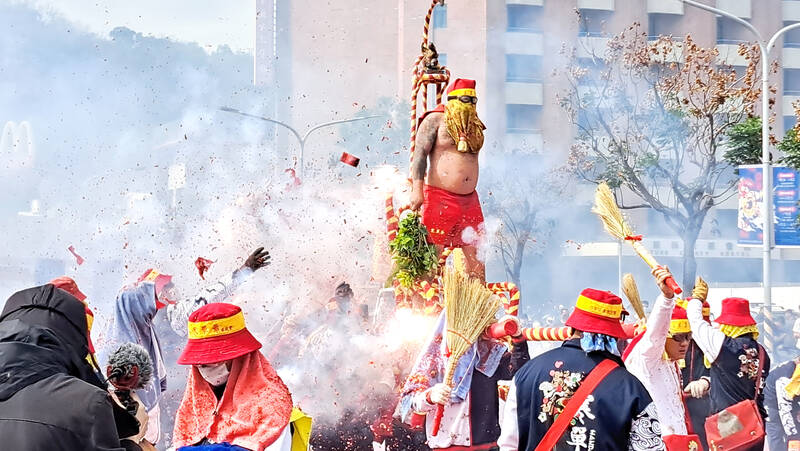Could Taiwan’s democracy be at risk? There is a lot of apocalyptic commentary right now suggesting that this is the case, but it is always a conspiracy by the other guys — our side is firmly on the side of protecting democracy and always has been, unlike them!
The situation is nowhere near that bleak — yet. The concern is that the power struggle between the opposition Chinese Nationalist Party (KMT) and their now effectively pan-blue allies the Taiwan People’s Party (TPP) and the ruling Democratic Progressive Party (DPP) intensifies to the point where democratic functions start to break down.
Both sides are taking big political risks that could turn off middle-of-the-road voters, especially the pan-blue side. On the other hand, they are revving up their voter bases, which may prove more valuable if they succeed.

Photo: Liu Hsin-de, Taipei Times
THE ‘GREAT RECALL’
In May last year, the KMT and TPP passed legislation to give the Legislative Yuan more powers constitutionally allotted to the Judicial Yuan and the Ministry of Justice. Tens of thousands of people, alarmed by the attempted power grab and the national security implications of handing judicial powers to the legislature to force government officials to submit to questioning poured out into the streets in a movement that came to be called the “Bluebird Action” (青鳥行動) movement.
The Constitutional Court struck down those provisions and the Bluebirds went home.

Photo: Chung Li-hua, Taipei Times
Then the KMT and TPP passed a law restoring the pre-2022 standard of requiring two-thirds of the justices to rule a law unconstitutional — rather than a simple majority — and required that 10 of the 15 justices be present. They then voted down all seven of President William Lai’s (賴清德) nominees for the court, leaving the court with only eight justices.
They then cut the budget by 6.6 percent and froze large chunks of what remained. To get those funds unfrozen, the government must submit to grilling by the legislature as to why they need the money.
DPP caucus convener Ker Chien-ming (柯建銘) has acted particularly outraged and said that the DPP would launch recall campaigns against 41 district lawmakers in the KMT caucus. The eight TPP legislators were voted in on the party list, so none can be recalled.

Photo: Huang Ming-tang, Taipei Times
President Lai, in his role as party chairman, declared that the DPP would not in fact be launching any recall campaigns, but “respects” any civic groups that chose to do so, and many have.
The pan-blue side has retaliated with recall campaigns against the DPP. Officially, the KMT is not behind them, but the KMT Youth League is openly organizing them.
At last count, 31 recalls of anti-pan-blue and 13 anti-pan-green campaigns had submitted signatures to pass stage one in the three-stage process, but more are coming in. In theory, 79 of the 113 legislative seats could face recall campaigns, though it is unlikely 79 would pass stage one, let alone get to a stage three public vote.
PARTISAN VIEWPOINTS
To deep blues, the recall campaigns are an undemocratic movement by Lai’s New Tide faction to reimpose the party-state enjoyed by former president Tsai Ing-wen (蔡英文). Hardcore TPP supporters also believe that Lai and his DPP regime are colluding with prosecutors to weaponize the legal system to “crucify” — as party chairman Huang Kuo-chang (黃國昌) recently put it — party founder Ko Wen-je (柯文哲) by framing him with trumped-up corruption charges.
They justify their actions as necessary to protect democracy from an undemocratic “green terror” by reigning in the power of the executive branch.
There is no evidence of President Lai acting unconstitutionally or of alleged collusion to frame Ko. They do have a point that their “great recall” (大罷免) campaign to overturn voting results from a year earlier is not typical democratic behavior.
Meanwhile, outrage and panic is coming from pan-green supporters who are accusing the pan-blues of paralyzing the government, provoking a constitutional crisis to seize more power, slashing funding for cultural programs that promote a localized culture and weakening the military — all to the benefit of the Chinese Communist Party (CCP).
This appeared in a Taipei Times editorial last week: “Budget cuts like this year’s are meant to destroy the nation and bring Taiwanese to ruin. The only realistic solution is to use recalls to fire the preposterous legislators who have no qualms about harming their own country to mislead others.”
I am pan-green, so unsurprisingly initially my take was similar to the above. If the pan-blue bloc does not back down, then all those worries above could well come to pass — a result no doubt some in the KMT caucus want.
BACK FROM THE BRINK?
Watching the behavior of President Lai, either he thinks that the KMT and TPP are bluffing and playing hardball, or he is letting them kneecap themselves.
Despite talk of challenging the Constitutional Court law before it became law under the old system, it did not happen and Lai signed the bill into law. Perhaps there is some procedural reason the law was not challenged — that there was too little time to deliberate perhaps — but as far as I know no attempt to challenge it.
It is also curious that after Lai’s candidates for the court were shot down last year, he has not nominated any new ones. Either he wants the pan-blues to create a constitutional crisis that will be blamed on them, or he is waiting to include this in future negotiations.
He has also continued to push for budget negotiations, and with his premier has convinced legislative speaker Han Kuo-yu (韓國瑜) to reconvene cross-caucus budget negotiations, but will KMT caucus convener Fu Kun-chi (傅?萁) and TPP convener Huang actually negotiate?
Both are saying they will not change their stance. Though known for changing his positions significantly over time, in the short term Huang is stubborn and is not likely to budge unless the KMT does first.
Whether Fu will or not depends on his own aims, pressure from party higher-ups and from within his caucus. Party higher-ups like party Chairman Eric Chu (朱立倫) and former President Ma Ying-jeou (馬英九) are likely to urge negotiations, but caucus firebrands like Jennifer Chen (陳玉珍) and Hsu Chiao-hsin (徐巧芯) and will likely urge standing firm.
Fu’s aims are an open question, but his recent behavior — and previous concerning ties to China — suggests he will only negotiate under pressure. There are some budget items cut or frozen that are unpopular with pan-blue supporters, leaving the door open for some negotiations.
Strategically it is in the KMT’s interest to back down and enter into grand negotiations that include the Constitutional Court issue. It is not necessarily in the TPP’s interest, whose lawmakers are safe.
The KMT’s problem is they have infuriated and frightened the pan-green base to such a degree that a fair number of the recall campaigns have a chance at succeeding because the minimum thresholds to successfully recall a lawmaker are low and pan-greens are currently highly motivated to make them happen.
Is this what President Lai is maneuvering for? Possibly. One thing we do know from the 2019 DPP presidential primary is that he is capable of political ruthlessness.
Donovan’s Deep Dives is a regular column by Courtney Donovan Smith (石東文) who writes in-depth analysis on everything about Taiwan’s political scene and geopolitics. Donovan is also the central Taiwan correspondent at ICRT FM100 Radio News, co-publisher of Compass Magazine, co-founder Taiwan Report (report.tw) and former chair of the Taichung American Chamber of Commerce. Follow him on X: @donovan_smith.

Google unveiled an artificial intelligence tool Wednesday that its scientists said would help unravel the mysteries of the human genome — and could one day lead to new treatments for diseases. The deep learning model AlphaGenome was hailed by outside researchers as a “breakthrough” that would let scientists study and even simulate the roots of difficult-to-treat genetic diseases. While the first complete map of the human genome in 2003 “gave us the book of life, reading it remained a challenge,” Pushmeet Kohli, vice president of research at Google DeepMind, told journalists. “We have the text,” he said, which is a sequence of

On a harsh winter afternoon last month, 2,000 protesters marched and chanted slogans such as “CCP out” and “Korea for Koreans” in Seoul’s popular Gangnam District. Participants — mostly students — wore caps printed with the Chinese characters for “exterminate communism” (滅共) and held banners reading “Heaven will destroy the Chinese Communist Party” (天滅中共). During the march, Park Jun-young, the leader of the protest organizer “Free University,” a conservative youth movement, who was on a hunger strike, collapsed after delivering a speech in sub-zero temperatures and was later hospitalized. Several protesters shaved their heads at the end of the demonstration. A

Every now and then, even hardcore hikers like to sleep in, leave the heavy gear at home and just enjoy a relaxed half-day stroll in the mountains: no cold, no steep uphills, no pressure to walk a certain distance in a day. In the winter, the mild climate and lower elevations of the forests in Taiwan’s far south offer a number of easy escapes like this. A prime example is the river above Mudan Reservoir (牡丹水庫): with shallow water, gentle current, abundant wildlife and a complete lack of tourists, this walk is accessible to nearly everyone but still feels quite remote.

In August of 1949 American journalist Darrell Berrigan toured occupied Formosa and on Aug. 13 published “Should We Grab Formosa?” in the Saturday Evening Post. Berrigan, cataloguing the numerous horrors of corruption and looting the occupying Republic of China (ROC) was inflicting on the locals, advocated outright annexation of Taiwan by the US. He contended the islanders would welcome that. Berrigan also observed that the islanders were planning another revolt, and wrote of their “island nationalism.” The US position on Taiwan was well known there, and islanders, he said, had told him of US official statements that Taiwan had not